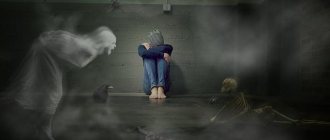Many people have experienced panic attacks at least once, and if this is an isolated case, then there is no harm to health and social activity. If panic occurs regularly, attacks cause a lot of problems. It is generally accepted that the cause of a panic attack is a suppressed reaction to stress. There are three ways for the body to respond to stress, to a threat - to fight, run away or hide, freeze. This applies to all living beings, but for humans, due to social norms, certain upbringing, and other restrictions, it is not always possible to respond to a threat. Panic attacks, by their origin, have a chain of causes; psychotherapy allows you to understand them, and some techniques help you control your condition. In fact, a panic attack is a reaction of fear when there is no real threat. Various phobias can manifest themselves not only by avoidance of certain situations or actions, but also in the form of panic attacks. Psychotherapists, together with the patient, treat panic attacks with the help of medications, psychotherapy, and special training.
Breathe slowly
How to get rid of panic attacks? Slow breathing helps to cope with a rapid heartbeat and shallow breathing, which are both symptoms of a panic attack and its provocateurs. By breathing slowly, you send a signal to your brain to calm down. This is one of the most effective physiological ways to stop a panic attack.
Focus on your breathing. Inhale for one-two-three-four, hold your breath for one second, exhale for one-two-three-four. Look at your stomach (even through clothes): how it inflates as you inhale and retracts as you exhale.
Treatment
Treatment of panic attacks is currently very successful and effective. When treating phobias and panic attacks, treatment is initially aimed at the root cause of the state of panic - the release of adrenaline, and therefore adrenergic blockers are used. However, before therapy it is necessary to exclude diseases with similar symptoms, among which sympathoadrenal crisis can be distinguished. In one case, a vegetative crisis may occur due to an adrenal adenoma - this is a benign tumor, due to which excess adrenaline can be released into the blood. In another case, a symptomatic adrenal crisis may occur against the background of neurosis, and disturbances of the autonomic nervous system may also be observed. The crisis is triggered by an incorrect command from the human brain addressed to the adrenal glands, as a result of which they mistakenly release adrenaline. However, a modern psychiatric clinic has a sufficient range of equipment, and thanks to the work of highly qualified specialists, it will not be difficult to confirm or refute this diagnosis. Psychotherapy plays an important role in the treatment of panic attacks, since drug treatment alone cannot eliminate the underlying cause of the disease. Drug therapy will help temporarily eliminate or mitigate the symptoms of the disease, but intensive psychotherapy can find and eradicate the true causes of panic attacks.
Admit you are having a panic attack
How to understand that you are having a panic attack and get rid of it? During a panic attack, a person catastrophizes what is happening: it seems that it is a heart attack, stroke, death, madness, that you are fainting or about to vomit.
Tell yourself mentally several times: “This is not a disaster, this is a panic attack.” The intensity of your symptoms will decrease and you will begin to regain consciousness.
Beck Scale: Test for Anxiety
Vegetovascular dystonia and panic attacks
A person who has experienced a panic attack will forever remember the feeling of overwhelming, unconscious fear. It evaporates as incredibly quickly as it appears. This anxiety is not inspired by the outside world, and irritability is not the outcome of the problems that have piled up. The patient experiences characteristic symptoms in the form of rapid heartbeat, breathing discomfort and tremors. The body seems to have received a dose of adrenaline, as panic begins from an inexplicable condition.
People say they feel their own death approaching and their minds clouded. Internal organs react sharply to the condition, causing chills, vomiting and fever. Patients rarely realize that they have become a victim of a panic attack. Due to VSD, the situation may repeat itself again and again until action is taken.
How is a panic attack related to VSD?
The human body is a single network where each internal organ is coordinated in one way or another with another. This rule does not bypass the nervous system, which is associated with VSD disease. According to researchers, this happens due to the constriction of blood vessels, which quickly deliver stimulation to the nervous system. A sharp jump in pressure creates the effect of a state of panic. There are explanations in psychoanalytic reasons, as well as in genetics. It is a clear fact that the disease passes from parent to child in ninety-five cases out of a hundred. As for mental disorders, in general, everything depends on the emotional instability of the person.
What are the reasons for panic attacks and how to avoid them?
From childhood, we are instilled with a love for a healthy lifestyle. Constant physical activity is a vaccine against diseases, especially nervous diseases. It is necessary to drive away negative thoughts, filling them with fitness, walks and all kinds of trips. It is the lack of physical activity and dependence on substances such as nicotine and caffeine that slowly but surely leads the body to an accumulation of tension.
How are panic attacks treated with vegetative-vascular dystonia?
If a patient experiences groundless panic, containing a number of the above symptoms, then doctors advise not to aggravate the process with medications in large quantities. Treatment of vegetative-vascular dystonia begins with sedatives - validol and corvalol. In this case, the use of an abundance of pharmaceutical drugs will not eliminate the disease in which neuroses worsen, but will turn into another bad habit. Tranquilizers and antidepressants are in demand, taking the patient out of negativity and creating a feeling of peace. Such medications have a small chance of getting rid of the disease with individual manifestations. But none of them is a surefire way to kill a panic attack with pronounced symptoms.
One of the best methods of coping is to make an appointment with a psychotherapist. The goal of the doctor is to influence the connection between the environment, personal experiences and the patient. If necessary, psychotherapy is used together with prescribed pills for neurosis. In addition, you need to independently learn relaxation in order to apply the methods during the next crisis.
Self-help for panic attacks
As mentioned earlier, a hypertensive crisis dramatically disarms a person, appearing at any moment of the day or night.
During the next attack, you cannot rely on your family and the ambulance team. You need to realize that if you don’t help yourself, your chances of getting back to normal are reduced. In such cases, instructions on proper breathing are used, since the next wave completely disrupts the heart rhythm. The supply of oxygen through four breaths per minute normalizes the heartbeat. The patient must understand that his tense state will subside in the near future. Manipulate your consciousness. Author: K.M.N., Academician of the Russian Academy of Medical Sciences M.A. Bobyr
Train your mindfulness
Mindfulness is the ability to notice what is happening in and around you.
Panic attacks often lead to a feeling of unreality, out-of-body, detachment from one's own body and from the world. Mindfulness helps cope with a panic attack and the first signs of its approach.
How to deal with panic attacks? Focus on your body, look at it or imagine with your eyes closed: how your feet touch the floor, how your clothes touch your skin, mentally move to the tips of your fingers.
To distract yourself, you can focus your gaze on familiar objects around you - a glass with pens and pencils, a plant on the window, a pattern on the wall or on the floor, and so on.
Panic disorder. Part 2. Treatment
It happens that a person suffering from panic disorder changes his entire lifestyle. The risk of attacks has to be constantly kept in mind, and this requires attention and effort. All activities and plans must be adjusted to “what if it starts.” The disease becomes a decisive factor not only for the patients themselves, but also for those closest to them.
Panic disorder: severity
To begin with, people may react to the presence of panic attacks to varying degrees. There are three degrees of severity based on how much their daily routine changes.
First degree.
The daily life of the patient changes very little here. Naturally, a person is upset that he periodically has attacks, however, nothing prevents him from leading a full lifestyle. He tries to avoid places and situations where he might have an attack, but does this without much emotional stress. If, for example, a person is afraid to ride in an elevator, then he will simply walk or wait for a fellow traveler to the upper floors.
Second degree.
If a person has a moderate severity of the disorder, their daily life is more affected. When he foresees another situation similar to the one that once caused the attack, he already experiences fear and anxiety within a few days. So, if a person knows that he can develop panic on an airplane, already weeks, or even months before the trip, he begins to shudder to think about the flight. Or how he will have a seizure, and there is not a single doctor on board.
But now the flight is over, the traveler leaves the plane as if from a torture chamber. And enjoys life until the next flight.
Third degree.
With a severe degree of the disorder, life becomes completely subordinated to panic attacks. The patient thinks about attacks constantly, replays events and situations that could cause an attack. His fears grow completely, the risk of an attack begins to be associated with the simplest events. What if I walk out of the entrance and get scared of something? What if I eat candy and choke? And you can’t force him to leave the entrance or eat candy if there is no one nearby who can save him from death.
Such patients are no longer satisfied with doctors’ explanations that their condition is associated with a mental disorder. They are sure that they have some serious illness that careless doctors simply cannot diagnose. It happens that a person with a severe form of panic disorder is completely attached to his home and sits within four walls for years.
In moderate to severe cases, so-called flashbacks are common. It is a violent and unexpected influx of experiences with images and even sounds associated with the attack. People are experiencing emotionally what happened to them during the attack. These conditions support the fear of a recurrence of the attack.
Social stigma
Despite the fact that most people who are far from medicine and psychology know about the existence of this disorder, in general society is not particularly friendly and sympathetic towards such patients. Doctors do not favor them for constant complaints about somatic diseases that do not exist. People around me don’t understand how a person can’t just pull himself together and stop panicking. After all, how many times they examined him - and found nothing! And he still can't stop acting like crazy! For this reason, people with panic attacks are viewed as spoiled weaklings or those who seek attention through cheap tricks.
Unfortunately, when a panic attack develops, it is impossible to pull yourself together and simply by willpower stop the raging body, take and block the flow of adrenaline with a wave of your hand. If it were that simple, then no one would suffer from any panic attacks. But for those who have not experienced it, it is often difficult to understand, and some simply do not want to go into detail. To make an assessment, it is enough information for them that “the doctor found nothing,” which means there is no disease - just inventions and whims.
Patients begin to feel embarrassed and worry because they cannot cope with themselves. Anxiety increases as they fear developing a panic attack in public. After all, perhaps others will judge and even laugh. Because of these fears, the condition of patients only worsens.
Just don't panic!
It is worth remembering that panic disorder is one of the most easily treatable mental disorders.
Measures to help with this disease can be divided into two large groups.
During an attack.
It often happens that an attack occurs at the most unexpected moment, during matters that require attention and precision, sometimes potentially dangerous. For example, a person can drive a car or operate a machine. In this case, it is advisable to immediately stop what you are doing.
Distract yourself with some simple and rhythmic action. Walk quickly, counting your steps, and focus on breathing. Very often, fixating on the symptoms of panic prolongs and intensifies it. For this reason, try to occupy your mind with something else.
Often tranquilizers (phenazepam, relanium) can interrupt the onset of an attack. However, you should resort to them on the recommendation of a doctor, and certainly not prescribe them to yourself. Drugs in this group have a number of contraindications and side effects that can increase panic symptoms.
Interictal treatment.
Even though there are no symptoms during this period, this time is worth spending usefully, taking care of your future condition.
The disease is treated with medications and psychotherapy. Unfortunately, these two methods do not work well alone, but together they significantly increase the likelihood of recovery. The most commonly prescribed medications are serotonin reuptake inhibitors (fluoxetine, sertraline) and benzodiazepines (phenazepam, relanium, mezepam). Self-medication with these drugs is contraindicated. The doctor must choose the right combination of medications and dosage in order to achieve resolution of symptoms and avoid the development of drug resistance.
It is also useful to take care of your physical health. Balance your diet and exercise. This will help harmonize the functioning of the nervous system, making it more resistant to external stimuli. Meditation will help you control your emotional reactions. This will greatly strengthen your ability to cope with the feeling of panic and the fear of its occurrence.
I repeat: panic disorder is completely treatable. You just need to make some efforts and, of course, not lose heart.
Natalia Stilson
Photo thinkstockphotos.com
Products by topic: [product](phenazepam), [product](fluoxetine), [product](sertraline)
Stop the attack with medication
Drugs from the group of tranquilizers (anxiolytics or anti-anxiety drugs) help stop a panic attack if you take the pill at a time when it is still in its infancy.
Tranquilizers cannot be taken by everyone; they are sold by prescription, so they must be prescribed by a psychiatrist or psychotherapist.
Panic attacks. Why don't pills help?
The cause of PA is the release of adrenaline into the blood
It is because of the strong release that a state of adrenaline overdose occurs and a vegetative crisis appears. Therefore, treatment of panic attacks in the initial stages is aimed at reducing and regulating the amount of adrenaline in the blood. Then symptomatic treatment is carried out and work with fear of a recurrence of panic.
How adrenaline affect the human body? This is a substance that is secreted by the adrenal glands and provokes a stressful state in humans. When released into the blood, adrenaline is quickly destroyed, entering into various biochemical reactions. Therefore, as soon as the adrenal glands stop producing adrenaline, the state of stress goes away. However, a person himself can cause relapses of this condition, being under the influence of an experienced event.
Outpatient and inpatient treatment
The Mental Health Clinic successfully combines the treatment of panic attacks both with medication and through psychotherapy. Most often, treatment for panic attacks is carried out on an outpatient basis, but there are also options for inpatient placement. The attending physician will select an antidepressant that will help relieve acute symptoms and draw up a treatment plan, including the prevention and relief of possible recurrences of panic attacks. Patients who clearly know how to help themselves when the disease manifests itself experience significantly less fear of the manifestation of a crisis, which reduces general anxiety and raises the emotional background in general. However, the most important psychiatric help for panic attacks is to conduct active psychotherapeutic work with the patient. This will allow you to find the root cause of the disease and, by completely eliminating it, get rid of the disease forever.
We can help you! Call us
Psychotherapy
Good results in the treatment of PA are achieved only with a combination of medication, pharmacotherapy and psychotherapy. The central task of the latter method is to gradually bring the patient to an awareness of the essence of the problem. Other goals of psychotherapy:
- identification and elimination of psychological intrapersonal conflicts;
- modification of previous inappropriate reactions to stress;
- developing healthy patterns and attitudes, attitudes and attitudes for learning mature adaptation mechanisms;
- working with self-control and adequate ways of responding;
- identifying the root causes of pathology.
In the cognitive behavioral approach, a psychotherapist or clinical psychologist teaches the patient techniques to control his own thought process. The client learns to understand his own condition and is able to identify factors that provoke anxiety. The nuances of the lifestyle and rhythm of life are examined.
Psychoanalysis helps to discover the subconscious, underlying causes of PA. Other approaches to the psychotherapy of panic disorder are classical or Ericksonian hypnosis, family consultations, and Gestalt direction. Psychotherapeutic relief of symptoms is the most effective method. Treatment takes from six months to 2-3 years. It takes effort from both the therapist and the patient.
Is it possible to overcome forever
To overcome panic disorder forever, long-term work with a psychotherapist, taking a course of medications, and the patient’s efforts are required. It is important to find the root cause of anxiety - it is often hidden deep in the subconscious. Next, you need to learn how to independently smooth out the symptoms during an attack.
The nuances of therapy depend on the severity of the disorder, its duration, severity and personal characteristics of the body. It is believed that the most severe PAs occur in those patients who perceived the first attack as a fatal catastrophe. The sooner treatment begins, the faster and easier it will be. Full recovery occurs in the presence of two factors - a competent treatment regimen and a lot of effort from the patient.
Consequences
Panic disorder, if the diagnosis is correct, does not go away “on its own.” Sometimes the intervals between attacks are quite long - up to 1-3 months. But without adequate treatment, the time interval between attacks gradually decreases.
Looking at panic attacks separately, researchers conclude that they do not pose a threat to life. But repeated PA without treatment will lead to the formation of depressive disorder, phobias, and neurosis. Over time, a person becomes a hypochondriac, stress resistance suffers, and increased suspiciousness arises.
Letting a disorder take its course is a health hazard. After a few months, the quality of life decreases noticeably. Mental and physical capabilities decline, and performance suffers. People who do not treat mental problems have problems in the area of social adaptation.







